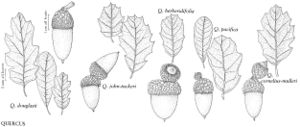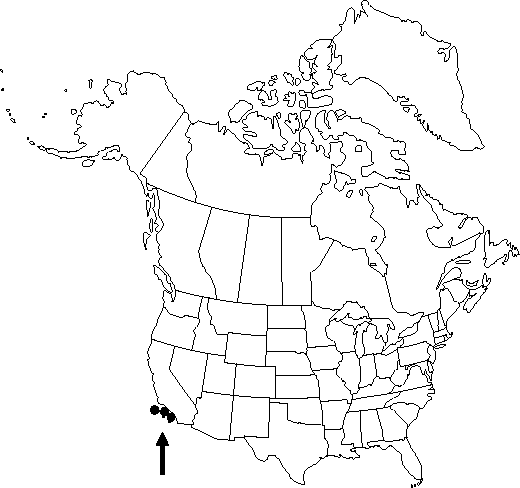Quercus pacifica
Novon 4: 391. 1994.
Shrubs, rarely small trees, subevergreen, shrubs to 2 m, trees to 5 m or taller. Bark scaly on older branches and trunk. Twigs brownish or reddish, minutely puberulent, becoming glabrate and gray with age. Buds light or chestnut brown, ovate or globose, 2-3 × 1-2 mm. Leaves: petiole 2-5 mm. Leaf blade obovate or oblong, planar to moderately convex or undulate, 15-40 × 7-20(-40) mm, base cuneate or rounded, attenuate-decurrent along petiole, margins minutely cartilaginous, entire or with 1-5 irregular teeth on each side, secondary veins obscure, 1-5 on each side, apex blunt or rounded, occasionally subacute with mucronate tip; surfaces abaxially waxy, glandular, with scattered minute, flat, appressed, ± 8-rayed stellate hairs, not obscuring surface, adaxially green, glossy, glabrate or with minute, scattered, stellate hairs. Acorns paired or solitary in leaf axil, subsessile, rarely pedunculate in teratological forms; cup hemispheric to turbinate, to 15 mm deep × 20 mm wide, enclosing only 1/4-1/2 nut, scales moderately to heavily tuberculate, irregularly formed; nut light brown, acute-cylindric or fusiform, tapered, (15-)20-30 × (6-)9-15 m, apex acute, glabrate. Cotyledons distinct.
Phenology: Flowering spring.
Habitat: Chaparral, oak woodlands, margins of grasslands, understory in closed-cone pine stands
Elevation: 0-300 m
Discussion
Of conservation concern.
Quercus pacifica is endemic on three of the California Channel Islands: Santa Cruz, Santa Catalina, and Santa Rosa. It is not known from the mainland, but it bears a superficial similarity to some of the tree forms that are putative hybrids between Q. engelmannii and Q. cornelius-mulleri in San Diego County. The latter populations, sometimes treated as Q. ×acutidens, differ in having much greater variability in leaf shape; thicker, more leathery leaves; denser abaxial leaf vestiture; much smaller hairs, having more than 10 rays; and variable levels of connation of cotyledons (always distinct in Q. pacifica). Quercus pacifica appears to be most closely related to Q. douglasii, whether by direct descent or by introgression with another species no longer extant on the islands.
Quercus ×macdonaldii Greene (as a species) [= Quercus dumosa var. macdonaldii (Greene) Jepson] is a stabilized hybrid complex between Quercus pacifica and Q. lobata Née. The plants tend to be small to moderate trees with leaves that resemble those of Q. lobata; the leaves are much more shallowly lobed and always less than two-thirds the distance from the margin to the midrib. Quercus ×macdonaldii is known from Santa Rosa, Santa Cruz, and Santa Catalina islands.
Selected References
None.

